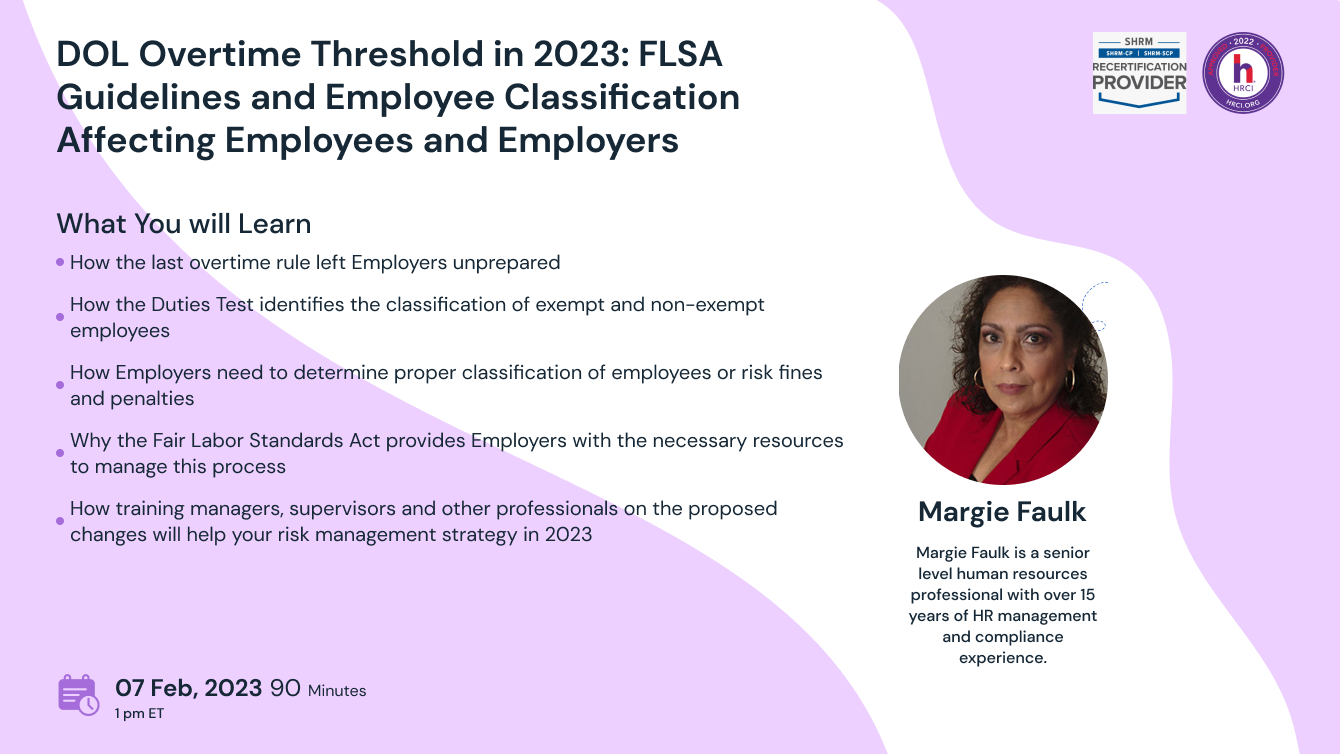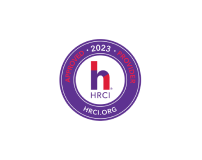DOL Overtime Threshold and Penalties Affecting the Employer’s Budget in 2023
The DOL is expected to increase the salary threshold for various overtime exemptions under the Fair Labor Standards Act. The proposed changes will impact Employers and employees. The DOL plans to make the changes effective in 2023. Employers should prepare now to review their workforce for exempt/non-exempt status to ensure they are compliant with the new overtime rule before the effective date is launched.
It’s important to correctly classify employees under the FLSA guidelines. Whether an employee will be hourly or salaried is not left entirely to an employer’s discretion, and the distinction is not as simple as “blue-collar” or “white-collar.”
Misclassification is one of the most common compliance mistakes. It can be costly on its own, but it also has implications that can lead to further noncompliance issues regarding attendance, timesheets, payroll, and benefits.
The overtime threshold is a salary level used to determine which employees are eligible to receive overtime pay when they work over 40 hours in a single workweek. The federal rules governing overtime pay were established by the Fair Labor Standards Act (FLSA), which also described which workers are exempt from these rules and which are not.
For non-exempt employees under FLSA, the overtime rate is at least one-and-a-half times the regular rate of pay for any hours worked above 40 in a given workweek. FLSA defines a workweek as a consecutive seven-day period of time. Employers can choose to pay a higher overtime rate if they wish, but they must meet the minimum federal standard.
Exempt employees, on the other hand, do not qualify to receive overtime pay. The overtime threshold and certain job duties—not job titles—classify individuals for exempt status. These roles are typically based on a yearly salary whereas nonexempt workers are usually hourly.
Join us this February to learn about the latest overtime threshold and how you can aptly classify your employees. You will also receive a FREE customized compliance tool to help you develop a better understanding. Register now!
Get Answers to
-What is the reason that the Department of Labor (DOL) proposing this new overtime rule?
-Why will the proposed increase shift employee’s classification?
-How will the proposed rule impact Employer’s budget in 2023?
-What resources and guidance will be offered to Employers to mitigate the changes?
-How to prepare for the proposed rule and be confident with compliance efforts?
What You will Learn
-How the last overtime rule left Employers unprepared
-How the Duties Test identifies the classification of exempt and non-exempt employees
-How Employers need to determine proper classification of employees or risk fines and penalties
-Why the Fair Labor Standards Act provides Employers with the necessary resources to manage this process
-How training managers, supervisors and other professionals on the proposed changes will help your risk management strategy in 2023
Why You Should Attend
The previous overtime rule, impacted Employers and employees in a way that affective morale, changed exempt employees to non-exempt employees, impacted salary calculations, changed employee classification and made the change an administrative nightmare.
Job descriptions were challenged, employee positions based on responsibilities impact the change not titles.
Now may be a good time for employers to consider whether the new rules provide a good opportunity to audit “close call” jobs in their exempt workforce to ensure they remain properly classified (and, if need be, to sync any necessary changes with the implementation of a new rule).
Who will Benefit
-All Employers
-Business Owners
-Company Leadership
-Compliance professionals
-Payroll Administrators
-HR Professionals
-Managers
-Supervisors
-Employers in all industries

Margie Faulk
Margie Faulk is a senior level human resources professional with over 15 years of HR management and compliance experience. A current Compliance Advisor for HR Compliance Solutions, LLC, Margie, has worked as an HR Compliance advisor for major corporations and small businesses in the small, large, private, public, Non-profit sectors and International compliance. Margie has provided small to large businesses with risk management strategies that protect companies and reduces potential workplace fines and penalties from violation of employment regulations. Margie is bilingual (Spanish) fluent and Bi-cultural. Margie’s area of expertise includes Criminal Background Screening Policies and auditing, I-9 document correction and storage compliance, Immigration compliance, employee handbook development, policy development, sexual harassment investigations/certified training, SOX regulations, payroll compliance, compliance consulting, monitoring US-based federal, state and local regulations, employee relations issues, internal investigations, HR management, compliance consulting, internal/external audits, and performance management. Margie’s unique training philosophy includes providing free customized tools for all attendees. These tools are customized and have been proven to be part an effective risk management strategy. Some of the customized tools include the I-9 Self Audit. Correction and Storage program, Ban the Box Decision Matrix Policy that Employers can provide in a dispute for allegations, Family Medical Leave Act (FMLA) Compliance Guide, Drug-Free Workplace Volatile Termination E-Book and other compliance program tools when attendees register and attend Margie’s trainings. Margie holds professional human resources certification (PHR) from the HR Certification Institution (HRCI) and SHRM-CP certification from the Society for Human Resources Management. Margie is a member of the Society of Corporate Compliance & Ethics (SCCE).
Standeagle Webinar Certification - Standeagle rewards you with Standeagle Achievement Certification for unlocking and attending this webinar. It is to acknowledge your participation in this training session and to add more to your professional score.
Standeagle Courses and Webinars or any Education published "Articles & Materials" strictly follows the standards and guidelines of the Professional Credit / CEU Providers and Well Researched before publishment.
Standeagle doesn't support any Fake - News, Articles, or Compliance updates; Our Industry Experts are highly verified and recognized, and their Pre-publishment is verified via our experts and fact-checkers.

ACCREDITATIONS


